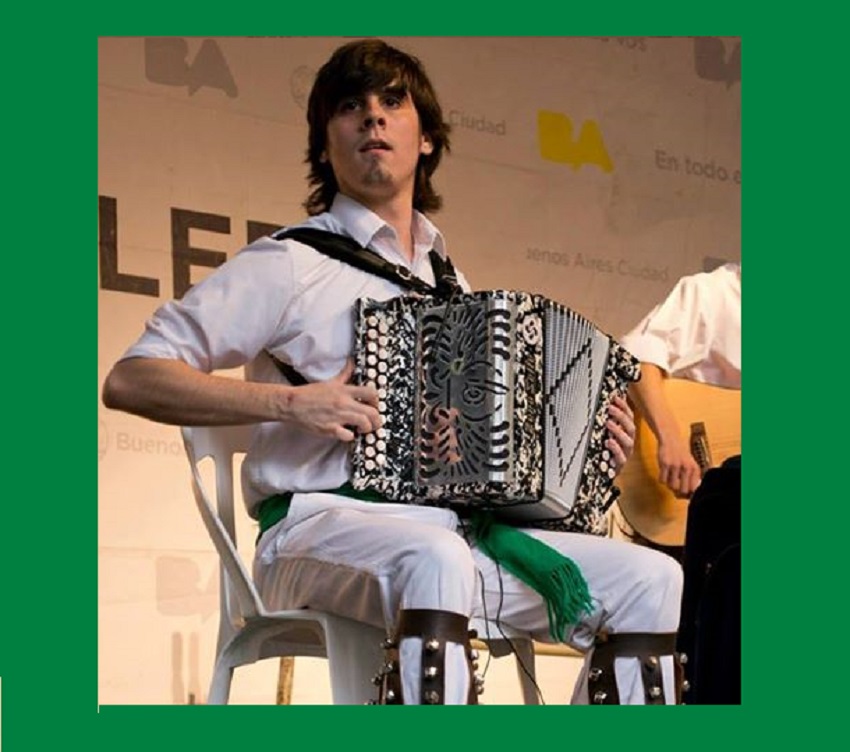Sabrina Otegui/Buenos Aires, Argentina. He represents the profile of youth in the Basque diaspora in Argentina; those that were born at the heart of a Basque club and have chosen to stay, and be a part of it, accompanying the institution in its activities. Ignacio combined this commitment with his passion, music, and so after studying the violin for more than 10 years, he chose to submerge himself in the passionate music of the trikitixa, the small Basque diatonic accordion, instrument of Italian origin that has been incorporated into Basque folklore and is currently one of its key pieces. He taught himself as a child how to play the accordion, and so Ignacio tells us what the triki and music from Euskal Herria mean to him.
-Why did you choose to become a Trikitilari?
-Its different sound fascinated me, rustic, very keen especially when interpreted along with dances. In addition, visually it is very attractive, how it is played, and I suppose that this was also part of my decision. It is curious because there is no other type of accordion that I like particularly, but the triki “opened my head” with respect to these instruments.
-You are a member of the Buenos Aires Laurak Bat Basque Club. What do you do at the club?
-As a musician, I accompany the dancers at events, at weddings or anywhere they are invited. Last year, for example, I played for the group during Semana Vasca in Villa Maria. There is no formal relationship, its more on my own to give it a touch that live music gives, especially the triki. I also started dancing as a child, under the direction or our actual director Mauro Uranga and I am still part of the group.
-Your link to the club is also part of a family legacy.
-Yes, and more, my grandparents Jose Miguel Barquin y San Martin, and my grandmother, Amaya Apoita, met dancing in the Laurak Bat group and since then we have continued the tradition.
-What does Basque music mean to you?
-It's hard for me to define Basque music, but I know that it gives joy and rhythm to the community. Even more, I would dare say that if the language allows for cultural maintenance, music has also always been there. It seems to me to be one of the best tools of belonging and connection between people that the Basque Country has been able to conserve. Basque music is strong and difficult to dissolve. I love music, and folkloric music even more, it attracts me, and I like to see people happy and dance when they hear it; maybe it’s a little egocentric, but I like the feeling when I play the triki because one touch can change everyone’s mood and may even lead them to dance.
-You are young but you must have experiences on stage that you remember especially.
-One of the experiences that really marked me was the first time I was on stage; it was at the theater at the Bernasconi College in Buenos Aires for the 130th anniversary festivities of Laurak Bat. On this occasion, I played the violin. It was also special the first time I played on Avenida de Mayo, at our first “Buenos Aires Celebrates the Basque Country” street festival, It was in 2011, and we played with the Ixilik group. The following year we performed again, and this time we invited Augusto Infante and Jeronimo Infante, dantzaris and musicians from the group in Chascomus, it was a very emotional and gratifying moment. I also played along with the group Baietz, from Cordoba. (Video of Bueno Aires Celebrates 2014 here).
-Are you in touch with musicans from other Basque clubs in the country?
-Last year, I had the pleasure of paying with boys from Mar del Plata, Juan Manuel Hiriart and Aitor Hormaechea, and of course I am in touch with participants from Gaztemundu for Music, that took place in 20143. We are also starting a project with Iñaki Eskirotz from the Euskaltzaleak Basque club. Luckily, I get along pretty well with all of them.
-You mentioned Gaztemundu, what was that experience like?
-It was very gratifying and refreshing; i met new people and great musicians in Vitoria-Gasteiz as well as from Argentina, and Chile that “opened my head.” It is something that I will never forget and I hope I will be able to repeat in the future. To be playing, seeing and living the dances in the Basque Country is something you can’t experience very often here.
-How do you get youth to play Basque instruments?
-I would tell them not to be afraid; in Argentina it is something very “popular,” known by people in general, and they are going to enter a very interesting world and a very rich musical culture that will never disappoint them.
-Finally, what do you want to achieve in your musical career?
-I would like to be able to make a living at this, but it seems very difficult to me…I would also like to play once with one of my referents, Kepa Junkera, Tapia eta Leturia, Iker Goenaga, Xabi Aburruzaga, Alaitz eta Maider, with Korrontzi…it would be an honor and I would like to be able to learn from them since I am self-taught I have my vices. But, oh well, it’s all to ‘make a little noise,’ isn’t it?






 Send to a friend
Send to a friend Add comment
Add comment








